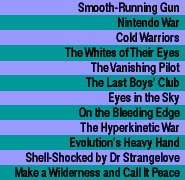


The Bloody Crystal
I feel the need,
the need for speed.Top Gun [the film]
The man who laughs has not yet been told the terrible news.
Bertolt Brecht
I fully expected that by the time I was 21... [s]cientific truth was going to make us so happy and comfortable... What actually happened when I was 21 was that we dropped scientific truth on Hiroshima. We killed everyone there.It's about five meters long, weighs about eight hundred kilograms, and costs about a quarter million dollars. It's just been launched from a French-made Argentine warplane, and as soon as the pilot releases it he speeds for home, his mission over.
Kurt Vonnegut, Breakfast of Champions
It isn't a bomb. It's a French-made flying robot. It carries 160 kilograms of high explosives and the computer smarts to deliver it in the teeth of sophisticated defenses. As long as its fuel lasts, it will hunt with ruthless precision, then blow itself and its target up. Three minutes from now it will destroy a British warship.
It's Tuesday, May 4, 1982, and Britain and Argentina are fighting the Falklands War. The missile is an Exocet. Four seconds after launch it is cruising only a few meters above the choppy South Atlantic. Named for a flying fish, the ship killer hugs the sea, lost in the confusing clutter of radar echoes from the cresting waves just below. It is too low for radar detection. Its computer keeps the missile low and on course, adjusting its stubby fins in response to signals from its internal sensors and gyroscopes. Moving at about eighteen kilometers a minute, it's less than three minutes away from the British destroyer H.M.S. Sheffield.
At about thirty seconds from impact it switches to an active homing radar, locking on. It rises slightly to scan the horizon and check the target, making sure it's still on course and prepared to counter any evasions in hundred-thousandths of a second. But there's no need for a course change. The target is unaware of its approach. The flying shark subsides back to wave level, lapping up the few remaining kilometers at supersonic speed.
The fifty-million-dollar Sheffield was protected by one of the most advanced defense systems ever built. Yet it was defenseless. When the missile struck, the men on the Sheffield had no idea what hit them; they had had only fifteen seconds warning. "On the upper deck you could feel the heat through your feet with your shoes on," the captain said later. "The superstructure was steaming, and the paint on the sides was coming off. The hull was glowing red and hot. We had no hope of retaining the fighting capability of the ship." The destroyer was lost, and with it twenty-one of its crew.
Of the ten ships and over a hundred aircraft lost by both sides in the Falklands War, robots destroyed more than half. Smart weapons like the Exocet have a better than nine-in-ten kill ratio against unwary foes. And they're cheap. War is quickly becoming a game only machines can play.